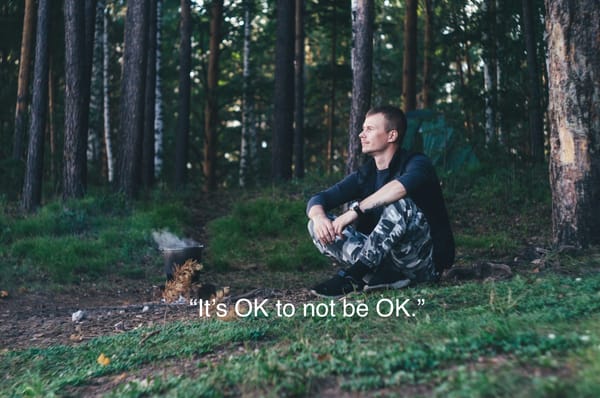Silent Burnout: The Hidden Cost of Always Being “The Rock”
Because even the strongest shoulders need rest, too.

I used to wear it like a badge of honor—being the one who held everything together.
The provider. The protector. The fixer. The strong one who “never breaks.”
I prided myself on how much I could carry. The long hours. The emotional load. The unspoken fears.
And for a while, it worked. Or at least… it looked like it did.
Until one day, I couldn’t fake the energy anymore.
I was running on fumes—but still pretending everything was fine.
That’s when I realized: I wasn’t okay. And I hadn’t been for a while.

What Is Silent Burnout?
It’s the kind of exhaustion that doesn’t always look like collapse.
It looks like showing up to work every day—but feeling numb.
It looks like being there for everyone else—but forgetting yourself.
It looks like snapping at the people you love, then blaming stress.
It looks like staying strong on the outside—while slowly falling apart inside.
Men are good at hiding it. We’ve been taught to.
We keep pushing. We tell ourselves: “Just a little longer.”
But burnout doesn’t ask for permission. It shows up quietly, then steals everything—focus, joy, energy, connection.

How I Knew I Was Burning Out (Even When I Didn’t Want to Admit It)
Looking back, the signs were there for a long time:
- Constant tiredness, no matter how much I slept
- Feeling irritable over small things
- Lack of motivation—even for stuff I used to enjoy
- Always “busy,” but never getting ahead
- Withdrawing from people I cared about
- Headaches, muscle tension, or random aches I ignored
The scariest part? I thought all of this was normal. Just part of being a man in a demanding world.

The Turning Point: Giving Myself Permission to Pause
There wasn’t some big dramatic moment.
Just a quiet one—where I finally admitted to myself: I can’t keep going like this.
So I did something radical:
I started listening to my body.
I let myself slow down.
I stopped pretending I was fine.
And I made room for something I hadn’t felt in a long time: relief.

Here’s What Helped Me Come Back to Life
These small shifts saved me from total collapse:
- I set real boundaries with work. Not everything is urgent. Not every call must be answered.
- I built in quiet time—daily. Even just 10 minutes to breathe, walk, or sit in stillness.
- I stopped trying to be “strong” alone. I opened up to a friend. Then another. Then a coach.
- I moved my body with care, not punishment. Stretching. Walking. Simple strength work.
- I reminded myself: Rest is productive. Especially when you carry a lot.

To the Man Who Feels This Too
If any of this sounds familiar, you’re not alone.
You don’t have to crash to justify resting.
You don’t have to pretend to be okay just because people expect you to be.
You are allowed to step back.
You are allowed to take care of yourself.
You are allowed to not have all the answers today.
Real strength? It’s not in the pushing.
It’s in the knowing when to pause.
Your worth isn’t in how much you carry. It’s in how well you care for the one who carries it all.



